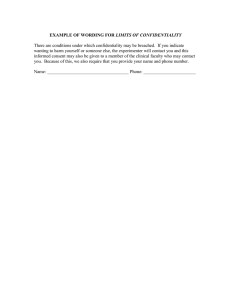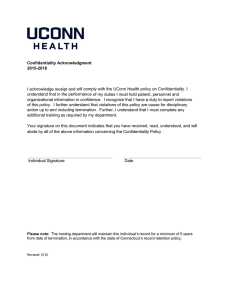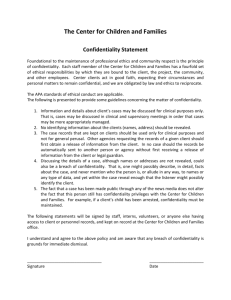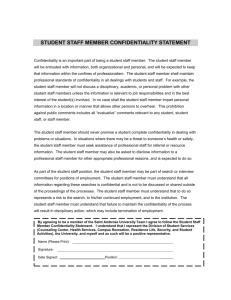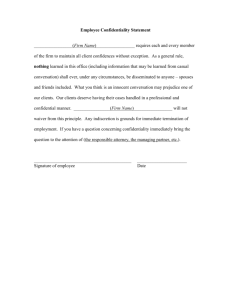Who Do You Trust? Moving On at SFU
advertisement
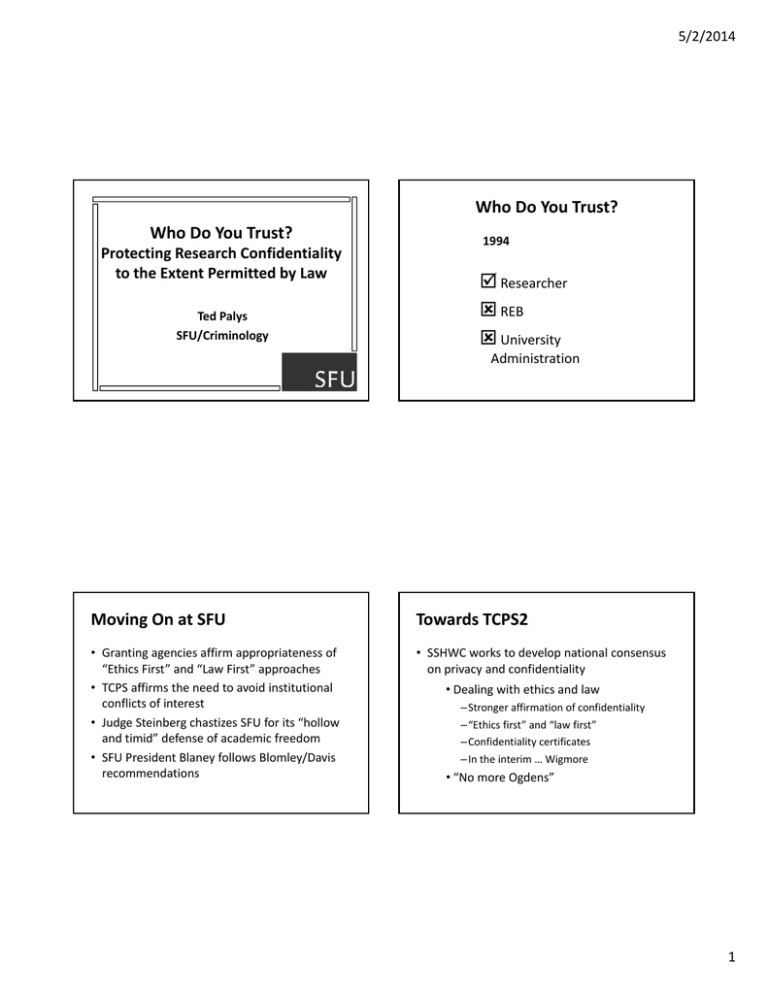
5/2/2014 Who Do You Trust? Who Do You Trust? Protecting Research Confidentiality to the Extent Permitted by Law Ted Palys SFU/Criminology 1994 Researcher REB University Administration Moving On at SFU Towards TCPS2 • Granting agencies affirm appropriateness of “Ethics First” and “Law First” approaches • TCPS affirms the need to avoid institutional conflicts of interest • Judge Steinberg chastizes SFU for its “hollow and timid” defense of academic freedom • SFU President Blaney follows Blomley/Davis recommendations • SSHWC works to develop national consensus on privacy and confidentiality • Dealing with ethics and law –Stronger affirmation of confidentiality –“Ethics first” and “law first” –Confidentiality certificates –In the interim … Wigmore • “No more Ogdens” 1 5/2/2014 TCPS2: Ethics and Law TCPS2: Ethics and Law • The ethical duty of confidentiality refers to the obligation of an individual or organization to safeguard entrusted information. The ethical duty of confidentiality includes obligations to protect information from unauthorized access access, use use, disclosure, modification, loss or theft. Fulfilling the ethical duty of confidentiality is essential to the trust relationship between researcher and participant, and to the integrity of the research project. • The ideal is to be both ethical and legal • However, if the two conflict, TCPS2 acknowledges the right of researchers in the last instant to take an ethics ethics-first first or law law-first first approach: – Researchers shall maintain their promise of confidentiality to participants within the extent permitted by ethical principles and/or law. (p.58) TCPS2: “No More Ogdens” • TCPS2 affirms even more strongly the view that confidentiality should be protected: 5.1 Ethical Duty of Confidentiality Researchers R h shall h ll safeguard f d iinformation f ti entrusted to them and not misuse or wrongfully disclose it. Institutions shall support their researchers in maintaining promises of confidentiality. (p.58) 2 5/2/2014 Rock to CAUT (from CAUT Bulletin) “The University of Ottawa recognizes its role … in safeguarding entrusted information. However, the University does not consider that its role extends to the payment of legal costs if researchers decide to challenge the seizure of research records in the context of criminal proceedings.” – Letter from U of O president Allan Rock to CAUT executive director James Turk Rock to REB • “The University of Ottawa places the utmost importance on the integrity of the research conducted by its professors and the critical role confidentiality plays in maintaining that integrity. … Professors Bruckert and Parent have the full support of the University of Ottawa in their proactive and responsible efforts to safeguard the confidentiality of this research. … With respect to payment of their legal fees, the University of Ottawa did in fact cover some of the initial legal costs related to this case.” 3 5/2/2014 4 5/2/2014 How Did They Do It? • By invoking a researcher-participant privilege • Three sources of privilege – Statute-based – Class – Case-by-case The Wigmore Criteria 1. • the communications must originate in a confidence that they will not be disclosed. Criterion 1: It’s Confidential Ogden • Submitted his research for Ethics review • Explained in his proposal why confidentiality was crucial to the validity of the research • Made clear to participants that their interactions were confidential and he would maintain that guarantee no matter what Bruckert/Parent • Submitted research for ethics review • Explained why confidentiality was crucial • Training of assistants emphasized confidentiality • “Confidentiality and anonymity will be respected at all times;” no limitations 5 5/2/2014 The Wigmore Criteria 2. • this element of confidentiality must be essential to the full and satisfactory maintenance of the relation between the parties. The Wigmore Criteria 3. • the relation must be one which in the opinion of the community ought to be sedulously fostered. Criterion 2: It’s Essential Ogden Bruckert/Parent • Asked participants whether they would participate if not confidential; all said “no” • Noted criminologist Richard Ericson testifies such research could not be done otherwise • Community health nurse testifies re costs to HIV/AIDS community • Confidentiality an essential part of SSHRC funding, REB approval • Noted criminologist John Lowman testifies research with such populations impossible to conduct without confidentiality • Participants would suffer harms from disclosure Criterion 3: It’s Valued Ogden • The academic/research community • Community of institutions faced with responding to the issue of euthanasia and assisted suicide • The community of persons suffering from terminal illnesses • Society at large Bruckert/Parent • Researcher-participant relationship important to academy and society • Protects academic freedom freedom, which is essential in a free and democratic society • Researchers accountable to their institutions, professional standards • Kudos to TCPS2 6 5/2/2014 The Wigmore Criteria 4. • the injury that would inure to the relation l ti by b the th disclosure of the communications must be greater than the benefit thereby gained for the correct disposal of litigation. Ethics-first will Law-first will • pledge “strict confidentiality” or say “completely confidential” • minimize risk through anonymization ASAP (if possible) and keeping secure in i iinterim t i • incorporate Wigmore when confidentiality is essential and disclosure would create harm • defend to highest court possible • pledge confidentiality “to full extent permitted by law” • ensure information obtained will not be problematic if disclosed e.g., MA v Ryan R • incorporate Wigmore when confidentiality is essential and disclosure would create harm • defend to highest possible court Criterion 4: Balancing the Scales Ogden • Research would provide the world with critical information about an important social issue • That information would not exist if it were not for the pledge of confidentiality • Society’s ability to gain from research would be hampered if researcher promises cannot be trusted Bruckert/Parent • Criminal activity per se not a problem • Valid data could not be gathered with a clear pledge of confidentiality • Psychiatrist testified information unlikely to be of value for NCR assessment • No more than a fishing expedition by Crown/police 7 5/2/2014 U Ottawa to SRCR U Ottawa to SRCR • “Regarding Dr. Palys' allegation that the University of Ottawa has breached Article 5.1 of the TCPS 2, we do not believe this is accurate Article 5.1 accurate. 5 1 may state that institutions should support their researchers but it does not stipulate how this should be done. The article deals with the responsibility of researchers, not the responsibility of universities.” • In reference to the TCPS2 sections on “Application” (of Article 5.1) and “Research Ethics and Law”: U Ottawa to SRCR SRCR to U Ottawa • “I wish to stress that the University does support its researchers in their endeavours and absolutely strives to provide an environment where they can freely conduct their research. This is evident, for example, in the University‘s support of its Research Ethics Boards (REBs). The REBs have never been influenced or asked to deny approval of research done on sensitive topics and this type of research is not discouraged.” • "In situations where safeguarding participant information may involve resisting an attempt to compel disclosure of confidential research information institutional support consists of information, providing researchers with financial and other support to obtain the independent legal advice which makes that resistance possible or ensuring that such support is provided." – “These passages set out important principles and practices relating to the researchers' duties to maintain confidentiality. What they clearly do not do is to direct institutions to provide financial support to researchers who are faced with a request to release research data to the authorities.” 8 5/2/2014 TCPS Interpretation Next Steps? • “The researcher conducts research under the auspices of the institution. The REB is appointed by the institution as its vehicle for reviewing research projects to ensure their ethical acceptability. p y In ggrantingg its approval pp for a study, y, the REB engages the responsibility of the institution to support the researchers in their commitment to protect participant confidentiality.” • "Institutions should establish a policy that explains how they will provide that support. " • The granting agencies could require universities as part of their MOU to contribute to a “defence of research participants” fund • Individual Universities could subscribe to an insurer such as CURIE to provide indemnification for researchers • Is it time to continue discussion about the possible development of confidentiality certificates? 9
